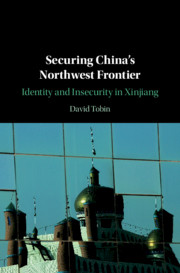Book contents
- Securing China’s Northwest Frontier
- Securing China’s Northwest Frontier
- Copyright page
- Dedication
- Contents
- Figures
- Abbreviations
- Introduction
- 1 Securing China on the Multi-Ethnic Frontier
- 2 Mass Education as an Identity-Security Practice
- 3 ‘East Turkestan’ in China’s Identity and Security Narratives
- 4 Identity and Insecurity after ‘7-5’
- 5 Performing Inclusion of the Uyghur Other
- 6 Han and Uyghur Narratives on Ethnic and National Identity
- 7 Han and Uyghur Narratives on Identity and Insecurity
- Conclusion
- Book part
- Bibliography
- Index
6 - Han and Uyghur Narratives on Ethnic and National Identity
Published online by Cambridge University Press: 18 September 2020
- Securing China’s Northwest Frontier
- Securing China’s Northwest Frontier
- Copyright page
- Dedication
- Contents
- Figures
- Abbreviations
- Introduction
- 1 Securing China on the Multi-Ethnic Frontier
- 2 Mass Education as an Identity-Security Practice
- 3 ‘East Turkestan’ in China’s Identity and Security Narratives
- 4 Identity and Insecurity after ‘7-5’
- 5 Performing Inclusion of the Uyghur Other
- 6 Han and Uyghur Narratives on Ethnic and National Identity
- 7 Han and Uyghur Narratives on Identity and Insecurity
- Conclusion
- Book part
- Bibliography
- Index
Summary
Chapter 6 uses detailed, semi-structured interviews with Han and Uyghurs in Ürümchi on tuanjie narratives to analyse the effects of nation-building. The first section analyses how Uyghurs and getihu Han dismiss tuanjie as propaganda but deploy it to re-perform minzu as fixed identity boundaries. Han intellectuals conceptualised Zhonghua Minzu through ethnocentric culturalism that includes Xinjiang as a frontier. The second section explores how Han deploy official narratives of Xinjiang’s 'liberation', defining Hanzu through lineage and language. Han nationalists re-perform officially articulated boundaries between ‘Inner-China’ and ‘frontier’ as timeless while culturalists framed Han ethno-nationalists as impediments to nation-building. Nation-building narratives are challenged by different Han identities arguing for more or less inclusion of non-Han. The final section shows how Uyghurs re-perform ethnic boundaries demarcated by Chinese nation-building, articulating their identity as a Turkic group living in a Hanzu nation. Uyghurs refer to their inferiority in official discourse and daily experiences of ethnic discrimination to locate their Turkic and Islamic identities outside Zhonghua Minzu. The chapter shows that nation-building in Xinjiang is failing because its model of inclusion runs counter to daily experiences of ethnic boundaries and perpetuates tensions between Xinjiang’s inclusion as Chinese territory and cultural exclusion as a frontier.
Keywords
- Type
- Chapter
- Information
- Securing China's Northwest FrontierIdentity and Insecurity in Xinjiang, pp. 166 - 191Publisher: Cambridge University PressPrint publication year: 2020



